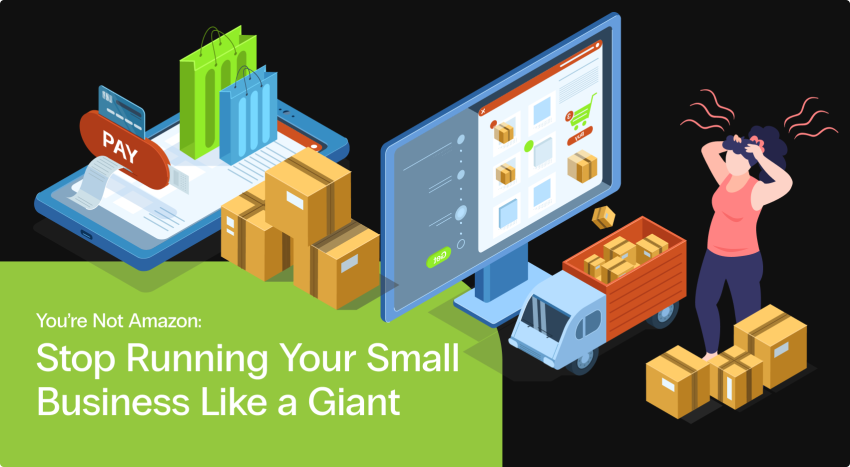You’re Not Amazon: Stop Running Your Small Business Like a Giant
It’s tempting to look at global giants like Amazon, Apple, or McDonald’s and think, “If I can just emulate their strategies, I’ll achieve the same level of success.” But here’s the truth: what works for a multi-billion-dollar conglomerate doesn’t necessarily work for your small business.
Small businesses often fall into the trap of trying to scale too fast, overcomplicate their operations, or implement systems designed for massive organisations. The result? Burnout, inefficiency, and missed opportunities.
This blog post explores why small businesses should stop trying to be mini-corporations and focus on the advantages of staying small, agile, and customer-centric.

The Pitfalls of Thinking Big
Emulating corporate giants can lead small businesses down the wrong path. Here’s why:
- Overcomplication of Systems:
- Large corporations need complex processes to manage their scale. Small businesses don’t. Attempting to mimic these systems can waste time and resources.
- Losing Agility:
- Giants like Amazon take years to implement significant changes. Small businesses have the advantage of pivoting quickly—but not if they’re bogged down by bureaucracy.
- Misaligned Priorities:
- Corporate giants focus heavily on shareholder value, market share, and automation. Small businesses thrive by focusing on their customers and local markets.
- Burnout from Overextension:
- Trying to scale too quickly, or adopt “Amazon-level” goals, can lead to financial strain and staff burnout.
Why Small Businesses Have the Advantage
Being small isn’t a disadvantage; it’s a superpower. Here’s why:
- Closer Customer Relationships:
- Small businesses can provide personalised service that corporate giants can’t replicate. Customers value a human touch over faceless interactions.
- Flexibility and Adaptability:
- You can test new ideas quickly and adapt to market changes without waiting for endless approvals.
- Community Connections:
- Small businesses are often deeply rooted in their communities, creating a sense of loyalty and support that larger corporations struggle to achieve.
- Unique Brand Identity:
- Instead of trying to scale to appeal to everyone, you can build a niche and dominate it.
Case Study: Bellroy
Bellroy, a Melbourne-based company specialising in slim wallets and carry goods, demonstrates the power of staying focused on a niche market. Instead of competing with massive global brands, Bellroy carved out a reputation for thoughtful design, sustainability, and high-quality products. They embraced their size by staying agile, introducing innovative designs like RFID-blocking wallets and expanding into complementary product lines like backpacks and phone cases.
Their commitment to quality and customer satisfaction has earned them a loyal following and significant international recognition without sacrificing their small-business roots (Source: The Australian).
Their success isn’t built on scalability—it’s built on creating a destination that customers love and talk about. By embracing their size and local focus, they’ve become a standout brand in Australia’s competitive hospitality scene (Source: Broadsheet).
How to Stay Agile and Focused
Here are actionable steps to ensure your business stays small, focused, and effective:
- Know Your Strengths:
- Identify what sets your business apart and double down on it. Don’t dilute your focus by trying to do everything.
- Keep It Simple:
- Streamline your operations. Avoid unnecessary tools, processes, or layers of management that add complexity.
- Prioritise Customers Over Scale:
- Focus on building strong relationships and delivering consistent value to your existing customer base.
- Embrace Your Size:
- Use your small size as a marketing advantage. Highlight your personal touch, community involvement, and bespoke services.
- Adapt Quickly:
- Stay attuned to market trends and be ready to pivot. Your agility is one of your biggest assets.
- Invest in Your Team:
- Happy, engaged employees are your best asset. Unlike corporate giants, you can maintain a tight-knit team culture.
Case Study: Frankie’s Beans
Frankie’s Beans, a Sydney-based coffee roastery, thrived by embracing its boutique size. Instead of competing with larger roasters on price, they focused on exceptional quality, ethical sourcing, and building relationships with local cafes. Their approach not only built a loyal customer base but also earned them industry recognition.
By staying small and prioritising quality over quantity, Frankie’s Beans created a brand that resonates with its audience and stands out in a crowded market (Source: BeanScene).
When Should Small Businesses Think Big?
That doesn’t mean small businesses should avoid growth altogether. Here’s when it makes sense to adopt big-business strategies:
- Streamlining Processes for Efficiency:
- Invest in tools that simplify tasks without overcomplicating them.
- Expanding Your Reach Strategically:
- Grow your business by entering new markets or introducing complementary products—but only after mastering your core offerings.
- Leveraging Technology:
- Use affordable tech solutions that scale with your business, like cloud-based tools, CRM systems, and e-commerce platforms.
- Building Brand Equity:
- Create a strong, recognisable brand identity that remains consistent as you grow.
Action Plan: Focused Growth for Small Businesses
Here’s how to stay small but mighty:
- Audit Your Operations:
- Identify unnecessary complexities and eliminate them.
- Focus on Your Niche:
- Become the go-to expert in your specific market or community.
- Engage Your Customers:
- Build strong relationships through personalised service and community engagement.
- Experiment on a Small Scale:
- Test new ideas without overcommitting resources.
- Celebrate Your Wins:
- Highlight the advantages of being small, from agility to personalised service.
Think Small to Win Big
You don’t need to emulate Amazon to succeed. In fact, trying to mimic corporate giants can distract you from what makes your business unique. By staying focused on your strengths, serving your customers, and embracing your size, you can build a thriving business that’s perfectly suited to your market.
Remember, success isn’t about being the biggest—it’s about being the best at what you do. Stay small, stay agile, and watch your business flourish.



